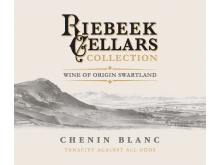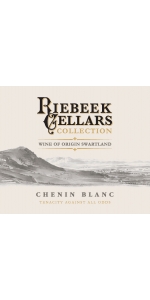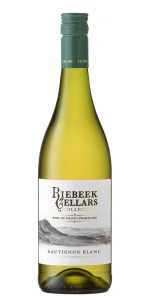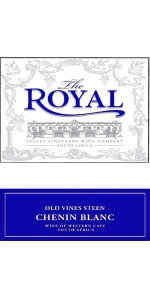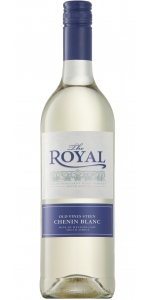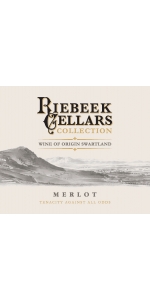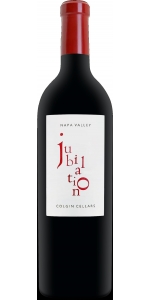Riebeek Chenin Blanc 2023
| Country: | South Africa |
| Region: | Riebeek Kasteel |
| Winery: | Riebeek Cellars |
| Grape Type: | Chenin Blanc |
| Vintage: | 2023 |
| Bottle Size: | 750 ml |
Riebeek Chenin Blanc is made from 100 percent Chenin Blanc.
As the unofficial drink of the Riebeek Valley, the Riebeek Chenin Blanc is the perfect every day wine that offers uncomplicated quality for the novice and connoisseur alike.
Packed with upfront tropical fruit, the nose charms with an abundance of guava and gooseberries. The pallets follows through with fruit flavors, balanced by a crisp acid to ensure a fresh and fruity style of wine.
Grapes came from both bosstok and trellised vines with some of the vineyards as old as 46 years. Fermentation was done at lower than usual temperatures to capture the fresh fruit flavors.
Very accessible and suited to almost every occasion, the Riebeek Chenin Blanc never disappoints.
Riebeek Sauvignon Blanc is 100 percent Sauvignon Blanc.
Made in a definite herbaceous style, this Sauvignon Blanc also offers tropical undertones of gooseberries that add fruit to the palate. Well-balanced with zesty acidity; fresh & crisp.
Treated as reductively as possible. Juice settled for 2 weeks at -4 Celsius to give green lees contact. Blocks fermented separately to ensure a complex flavor profile after blending. After fermentation was completed, various wines were blended to obtain the best characteristics of each wine.
Very refreshing on its own and lovely with crisp salads, light seafood dishes, tapas, steamed green asparagus and aioli.
Riebeek Sauvignon Blanc is 100 percent Sauvignon Blanc.
Made in a definite herbaceous style, this Sauvignon Blanc also offers tropical undertones of gooseberries that add fruit to the palate. Well-balanced with zesty acidity; fresh & crisp.
Treated as reductively as possible. Juice settled for 2 weeks at -4 Celsius to give green lees contact. Blocks fermented separately to ensure a complex flavor profile after blending. After fermentation was completed, various wines were blended to obtain the best characteristics of each wine.
Very refreshing on its own and lovely with crisp salads, light seafood dishes, tapas, steamed green asparagus and aioli.
The Royal Chenin Blanc Old Vines Steen is 100 percent Chenin Blanc.
As the unofficial drink of the Riebeek Valley, Chenin Blanc is the perfect every day wine that offers uncomplicated quality for the novice and connoisseur alike. Packed with upfront melon fruit, the nose charms with an abundance of guava and gooseberries as well as the signature hint of honey. The palate follows through with fruit flavors balanced by a crisp acid to ensure a fresh and fruity style of wine.
Enjoy well-chilled as a lovely crisp glass on its own but ideal for al fresco dining and with light summer fare. Beautiful with salads, anti pasti and seafood.
The Royal Chenin Blanc Old Vines Steen is 100 percent Chenin Blanc.
As the unofficial drink of the Riebeek Valley, Chenin Blanc is the perfect every day wine that offers uncomplicated quality for the novice and connoisseur alike. Packed with upfront melon fruit, the nose charms with an abundance of guava and gooseberries as well as the signature hint of honey. The palate follows through with fruit flavors balanced by a crisp acid to ensure a fresh and fruity style of wine.
Enjoy well-chilled as a lovely crisp glass on its own but ideal for al fresco dining and with light summer fare. Beautiful with salads, anti pasti and seafood.
Riebeek Cellars Merlot is made from 100% Merlot.
Grapes were cold soaked overnight. Inoculated with selective yeast. Fermentation took place at 24 - 26 degree Celsius. Wine were pressed at
above 2 degree Balling. Malolactic fermentation finished in stainless steel tanks. Oak maturation include French oak chips, French oak staves and 2nd and 3rd fill barrels. All blended together to perfection.
The style is elegant with distinctive red berries and well-integrated wood flavors on the nose. The pallet is velvety and smooth with an aftertaste that lingers with the juicy flavors of abundant berries.
At room temperature or slightly chilled. Enjoy with pasta or light meat dishes.
Riebeek Chenin Blanc is made from 100 percent Chenin Blanc.
As the unofficial drink of the Riebeek Valley, the Riebeek Chenin Blanc is the perfect every day wine that offers uncomplicated quality for the novice and connoisseur alike.
Packed with upfront tropical fruit, the nose charms with an abundance of guava and gooseberries. The pallets follows through with fruit flavors, balanced by a crisp acid to ensure a fresh and fruity style of wine.
Grapes came from both bosstok and trellised vines with some of the vineyards as old as 46 years. Fermentation was done at lower than usual temperatures to capture the fresh fruit flavors.
Very accessible and suited to almost every occasion, the Riebeek Chenin Blanc never disappoints.
The Riebeek Cellars Estate
Riebeek Cellars was established in 1941 and is situated in Riebeek Kasteel at the foot of Bothma's Kloof Pass. This medium-sized winery on the western coast of the Cape Province of South Africa sources its grapes from the fertile Riebeek Valley and the slopes of the mountain where the climate is very similar to the Mediterranean. Through the years as vineyard practices developed, cultivars were planted in soil and at slopes best suited to them. These well-tended vineyards enable the production of high quality wines which makes Riebeek Cellars the choice of wine buyers internationally. Well-known both in South Africa and abroad, Riebeek Cellars manages a variety of brands for various countries.
Heritage
Corporal Pieter Cruythoff, a scout of Jan van Riebeeck, founded the Riebeek Valley in 1661. Impressed by the single standing mountain, he called it Kasteelberg (“Castle Mountain”) commemorating the Castle of Good Hope in Cape Town, the fortress of Commander Jan van Riebeeck. The twin towns, Riebeek Kasteel and Riebeek West, established at the foot of Kasteelberg, are therefore also suitably named after Van Riebeeck.
The Riebeek Valley is a mecca of wonderful wines, exceptional food and exquisite art where tourists and locals alike are forever tempted into spending more time than allowed. The serene valley falls in the bigger Swartland region which is called the 'bread basket' of South Africa for its grain production, while it is further internationally acclaimed for its high quality olive products. With various hotels and fine-dining restaurants as well as true country hospitality, the Riebeek Valley has become a very popular tourist destination. The ultimate charm of Riebeek is however in its people and their commitment and passion for wine.
"Located in the Western Cape region of South Africa, this winery was established in 1941, which makes it relatively old compared to all the new wineries that have sprung up in this area. Among the first Pinotages I can recommend, it’s also a good value. Pinotage, which is, of course, ubiquitous in South Africa, was first made in 1941, when the Cinsault grape (primarily grown in southern France and the Rhone Valley) was crossed with Pinot Noir." - Robert Parker's Wine Advocate (Issue 201, June 2012).
Jubilation is our newest wine in the Colgin Cellars collection. Jubilation is our Cabernet Sauvignon-based wine created with a selection of barrels that display earlier drinking characteristics from our three hillside vineyards. As our vine age has matured and small additions have been made to our original holdings, we had the privilege of increasing our selectivity. Following the blending of our single-vineyard wines, we were fortunate to have a collection of barrels that conveyed the same elegance and complexity for which we are known, yet on a more supple, approachable frame. Jubilation is a wine ready to enjoy now, with the pedigree to age gracefully in the cellar, maintaining the Colgin Cellars’ hallmarks of perfume, freshness, and minerality. The inaugural bottling of Jubilation from the 2016 vintage was released in late 2020. Future vintages are destined for select members of the fine wine trade.
- back
All older vintage wines have been purchased from a single collectors cellar. Pictures can be requested before shipment.
Philippe Milan Pommard AOC is 100% Pinot Noir.
This wine has been aged in Oak (25% new Oak).
This is a little more structured and the style goes more toward the
"vin de garde", or wines meant to age. This wine needs some food, or sometime
in the decanter right now. It is well structured and reminds me of a Volnay. As
a matter of fact, the parcel is located right next to Volnay. The finish is
long and still quite juicy with chewy tannins lingering.

